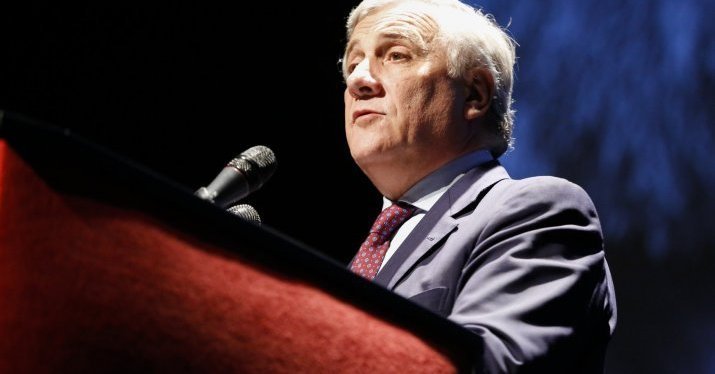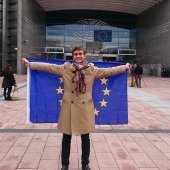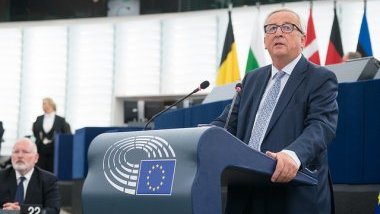A Europe faced with unanswered crises and challenges
The President of the European Parliament began his speech by giving an overview of the crises and challenges that the European Union is facing, including Brexit and the need to maintain peace on the island of Ireland, as well as citizens’ rights. He also insisted on the importance of not dividing the four freedoms (goods, people, capitals and services), so as to protect the integrity of the European Single Market. Tajani believes that the EU has to regain a preponderant and proactive position on the international arena, be it trade matters vis-à-vis Russia, the USA or China, or the fight against climate change. According to Tajani, Europe should exercise leadership and assert itself as a political union.
Antonio Tajani emphasised that Europe is a continent of freedom where a multitude of cultures and identities live together, a situation that has to be preserved. For him, the EU must not replace nation-states, but instead it should do what states or regions cannot do, all the while ensuring that the principle of subsidiarity is respected.
On the need to reform Europe
Antonio Tajani acknowledges that not everything works in the EU, but that doesn’t mean that we should leave or abandon the European project. On the contrary, for the President of the European Parliament, the EU has to continue guaranteeing peace and to safeguard its concrete achievements (the single currency, the end of border controls etc). With the rise of populist and nationalist movements, he invites Europeans to reflect on and rethink their conception of politics in order to build a new vision of a European project that helps them feel safe on their continent.
European elections 2019: An opportunity not to miss for the European Parliament
After the speech, Le Taurillon interviewed Antonio Tajani about the issues of the upcoming European elections not only for the Parliament but also for his political family, the EPP. He pronounced himself in favour of the Spitzenkandidaten principle, but reminded that European election campaigns unfortunately have the tendency to cover national and not European issues, which reduces citizens’ involvement in the elections.
Louise Guillot, Le Taurillon (LT): The European Parliament was elected with a low turnout in the elections, particularly among young people. Why should European citizens go vote in May 2019?
Antonio Tajani (AT): I think that everyone should decide for their own future. Voting means that I decide on my and my family’s future. I think it’s a mistake to leave others with the power of deciding on my future, which is why you need to participate.
Of course there are citizens who are unhappy with the situation, so they try to protest by saying “I won’t be going to the polls”. But that’s why there’s a campaign by the European Parliament to encourage European citizens to vote.
LT: How do you foresee the composition of the European People’s Party ahead of the European elections? And what place would Fidesz have in the group?
AT: I think that until the elections, there won’t be changes. We have discussed with Viktor Orbán and we clearly explained to him what the limits are, what the EPP’s values are. I think that he can stay in the EPP family, even if we don’t share everything he’s done. But it’s very important to me that the EPP is the first political family in the European Parliament to defend Europe, to defend our values. I think that if things go in the right direction, the EPP will be the strongest political force in the European Parliament after the elections in May.
LT: Alexander Stubb recently said: “Regarding Fidesz, Orban’s party, I think that values are the most important element. However, with values, it’s binary, either you’re with us, or you’re somewhere else”. Do you agree with him?
AT: Alexander Stubb is running ahead of the EPP Congress but I’m not declaring myself in favour of him or of Manfred Weber. All the candidates seek to explain their programme and what they would like to do as the Commission President. So they are doing an electoral campaign and I need to refrain from commenting.
LT: What will be the first task of the new European Parliament after May 2019? What do you think are the most urgent topics to address?
AT: Firstly, it needs to try to shorten the distance between the citizens and the European institutions. Like I said, the Parliament is the only institution that can work in this direction because we’re directly elected by the citizens. And I think that the Parliament also has to engage to get a good budget for 2021-2027 because I’m afraid we won’t have the possibility to vote on the budget before the elections. So the Parliament will have to engage to have a good budget, as well as own resources to supply this budget. Regarding this, it needs to defend cohesion funds and agricultural funding.
LT: The European Week of Regions and Cities took place a few days ago. In your opinion, what role do regions play in the European Union, and what kind of a future does cohesion policy have, given that the overall budget of the EU will most likely be reduced?
AT: I am not favourable to cutting cohesion funds and I very much believe in the principle of subsidiarity. Europe needs to do what member states can’t do, member states shouldn’t do what regions can do, and regions shouldn’t do what the cities can do: that’s the ladder of subsidiarity. I think that regions and cities have a very important role to play to resolve the problems that are closest to the citizens. It’s up to us to work against immigration, against terrorism, for foreign policy, but the things at the local level need to be in the hands of regions and cities.




Follow the comments: |
|
